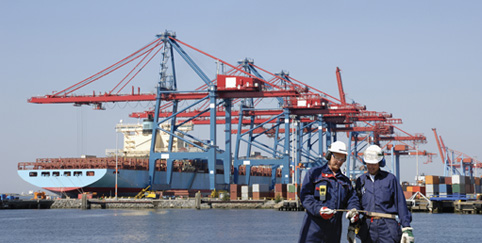The four-month slowdown at 29 ports on the U.S. West Coast in late 2014 and early 2015 serves as the most recent reminder of the massive supply chain ramifications of port disruptions due to labor disputes.
The West Coast situation was the result of protracted contract negotiations between the Pacific Maritime Association, which manages all of the ports in Washington, Oregon, and California, and the International Longshore and Warehouse Union (ILWU). The previous five-year contract between the two parties ended on July 1, 2014 and the slowdowns peaked from November 1, 2014 through February 20, 2015.
The Pacific Maritime Association alleged that the union intentionally and significantly reduced productivity, suspending negotiations for long periods. Port management, in turn, barred weekend and holiday operations at certain times during the dispute. Ultimately, the U.S. government had to step in, first by sending a federal mediator and then, in February, by dispatching U.S. Secretary of Labor Thomas E. Perez to the West Coast. Pacific Maritime and the ILWU reached an agreement in principle in late February, with the ILWU ratifying the final contract on May 20, 2015.
A Brief History of Disputes
While more enduring than many port disputes, the recent West Coast standoff is not unique. Potential disruptions loom every five years on the West Coast alone, with occasional slowdowns or stoppages in the interim as well. In 2012, an eight-day strike affected the ports of Los Angeles and Long Beach, as did an 11-day lockout in 2008 and a 10-day strike in 2002. Back in 1971, a strike went on for 134 days.
While significant stoppages at other U.S. ports occur less frequently than on the West Coast, the threat exists for eastern and Gulf coasts too. At the end of 2012, an expected strike in these two regions was averted after preliminary talks on container royalties and other contract issues led to a new agreement.
Port disruptions are certainly not new; they’ve been occurring for decades. A half century ago, the 1965 Delano grape strike by the Agricultural Workers Organizing Committee and the United Farm workers, which spread from the grape fields to the ports, lasted more than five years with a devastating effect on the industry.
The ramifications for the fresh fruit and vegetable industry, with highly perishable and seasonal product, are especially harsh. So what can shippers and receivers do to avoid these situations? Are there contingency plans every supplier should have in place?
Preparing for Problems
We all know hindsight is 20/20, but buyers and sellers of fresh produce were caught off guard and hit hard by the recent crisis at West Coast ports. Many were shipping fruit for occasions like the Chinese New Year, and with much of the West in peak season at the time, this equated to a significant number of containers heading for Asia.



